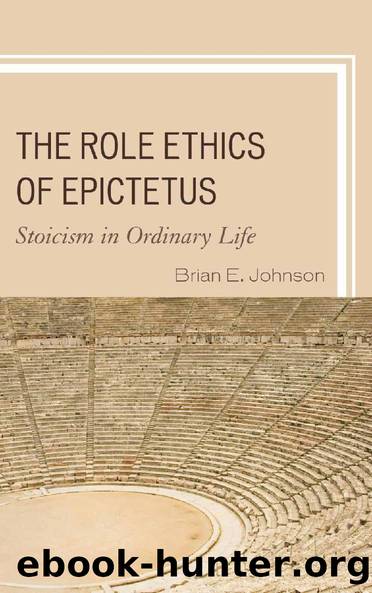The Role Ethics of Epictetus by Brian E. Johnson

Author:Brian E. Johnson [Johnson, Brian E.]
Language: eng
Format: epub
Tags: undefined
Publisher: Lexington Books
Published: 2013-12-04T06:00:00+00:00
Beyond Socrates and Heracles
In view of the preceding discussion, it seems that Epictetus supplies two related considerations for claiming that we have multiple specific roles, that these roles generate specific appropriate acts, and that these appropriate acts can conflict. First, for Epictetus, it appears to be a basic fact about human beings that they are members of several different kinds of communities. It is because Socrates is a member of Athens and is a member of a specific family that he has the role of citizen and the role of father. Of course, Socratesâs humanity makes possible certain kinds of community roles (such as that of âgadflyâ), but his humanity is not sufficient by itself to explain his role in the civic community. As I have argued, each community membership constitutes a distinctive role with distinctive obligations. In this way, when we consider that Epictetus takes humans to be members of at least two sorts of communities (cosmic and civic) and that humans have many different capacities and functions to be fulfilled within a given civic community, Epictetus has good grounds to conclude that humans have many roles.
Second, Epictetus supplies us with an account of how specific roles relate to their associated externals. In the case of Heracles, his heroic role is not simply an extension of his human role. If it were a mere extension and if there were no hydra or lion, it would be wrong for Heracles to sleep because dormancy would make him more of a plant than a human. Without those feats, Heracles should find some other way to express his humanity. By contrast, I have argued that we can account for why Heracles sleeps and why he is awoken by appeal to his specific role. Heracles did not fight the hydra in order to express his humanity, rather he fights the hydra because he has the role of the âbull in the herd.â Although it remains true that externals (such as mythic beasts) ought to be treated in a way that is consistent with oneâs humanity, Epictetus nonetheless gives a special place to externals because he seems to treat specific roles (and their associated externals) as constitutive of who we are and as ends-in-themselves.
Download
This site does not store any files on its server. We only index and link to content provided by other sites. Please contact the content providers to delete copyright contents if any and email us, we'll remove relevant links or contents immediately.
The remains of the day by Kazuo Ishiguro(8961)
Tools of Titans by Timothy Ferriss(8357)
Giovanni's Room by James Baldwin(7313)
The Black Swan by Nassim Nicholas Taleb(7097)
Inner Engineering: A Yogi's Guide to Joy by Sadhguru(6780)
The Way of Zen by Alan W. Watts(6589)
Asking the Right Questions: A Guide to Critical Thinking by M. Neil Browne & Stuart M. Keeley(5747)
The Power of Now: A Guide to Spiritual Enlightenment by Eckhart Tolle(5740)
The Six Wives Of Henry VIII (WOMEN IN HISTORY) by Fraser Antonia(5493)
Astrophysics for People in a Hurry by Neil DeGrasse Tyson(5172)
Housekeeping by Marilynne Robinson(4430)
12 Rules for Life by Jordan B. Peterson(4298)
Double Down (Diary of a Wimpy Kid Book 11) by Jeff Kinney(4257)
The Ethical Slut by Janet W. Hardy(4235)
Skin in the Game by Nassim Nicholas Taleb(4231)
Ikigai by Héctor García & Francesc Miralles(4228)
The Art of Happiness by The Dalai Lama(4118)
Skin in the Game: Hidden Asymmetries in Daily Life by Nassim Nicholas Taleb(3985)
Walking by Henry David Thoreau(3948)
